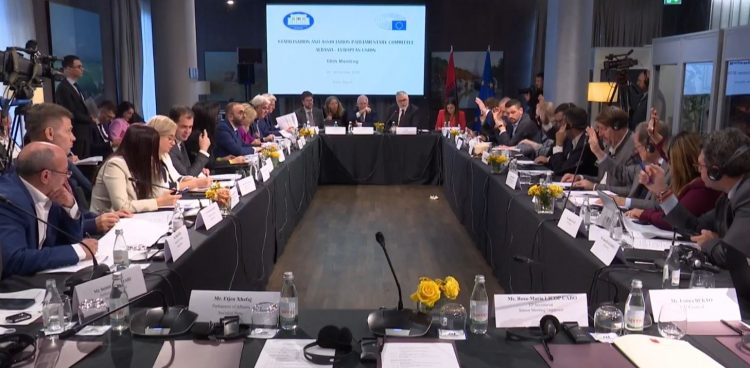Albanian opposition refuses to endorse Joint Resolution in 18th EU-Albania SAA Parliamentary Committee Meeting

During the 18th meeting of the EU-Albania Stabilization and Association Parliamentary Committee held on October 29 and 30 in Tirana, the committee failed to issue a joint resolution. The Democratic Party’s delegates refused to endorse the final draft despite repeated requests from European Parliament members, signaling a significant setback in sending a positive message to the EU about Albania.
Why is this important: The refusal underscores the increasing radicalization of the Democratic Party’s stance. However, due to the party’s growing isolation, this rejection may risk further marginalizing the opposition from the integration process rather than impacting the government. It risks alienating the party from both voters and international partners.
Details of the resolution: The resolution addressed critical issues including the rule of law, the fight against crime and corruption, media freedoms and elections, economic development and tourism, and good neighborhood relations and regional cooperation. However, the opposition insisted on highlighting what they described as the Albanian government’s efforts to undermine checks and balances, a stance unacceptable to both the majority representatives at the meeting and the European Parliament members.
Focus of the debate: European Parliament member Grigorio Gori urged the opposition to reconsider their stance, emphasizing the negative signal that blocking the resolution would send to the EU. However, opposition members Gazmend Bardhi and Jorida Tabaku held firm on their positions, attributing their refusal to the majority’s prior rejection of their amendments.
Statements and reactions:
- Grigorio Gori highlighted the need for compromise, noting that concessions were made to reach a consensus. He expressed hope that the resolution would be approved by abstention to acknowledge the difference in opinions.
- Gazmend Bardhi and Jorida Tabaku expressed disappointment with the EU representatives’ failure to call on the majority to also consider amendments, stressing that their non-support was a direct result of their proposals being ignored.
The day before the meeting, Marco Tarquini, head of the European Parliament delegation, praised Albania’s steps toward EU integration, highlighting the significance of bipartisan cooperation for Albania’s EU path. Despite this, debates were intense, with some opposition members suggesting the public discussion was being used to stage a political show rather than to engage constructively.
Giorgio Gori also expressed frustration over the meeting being used to deepen conflicts between the opposition and the majority, likening it to a settling of scores rather than a constructive dialogue.
What next: Despite attempts to reflect and reconsider, the Democratic Party ultimately prioritized party interests over national interests such as timely EU membership. The majority’s amendments, which focused on judicial reform and government efforts to combat organized crime and corruption, received support from European Parliament member Fredi Beleri, who, contrary to accusations in Greek media, supports the Albanian government’s integration efforts with actions rather than words.


